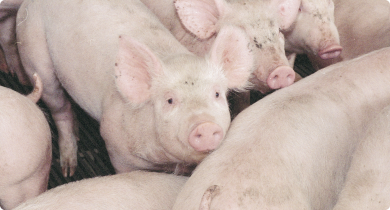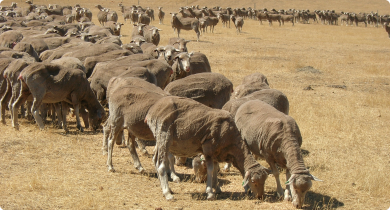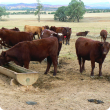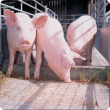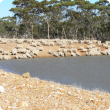Feeding & nutrition
What animals eat has a major impact on performance, profitability and quality of the end product. For intensive livestock (pigs, poultry and sheep and cattle in feedlots), cereals, legumes and protein meals make up the majority of the diet and are formulated to meet diet specifications. For extensive animals, quality of pastures and year-round supply become major issues.
The Department of Primary Industries and Regional Development supports the livestock industry by conducting a range of research activities, often in collaboration with industry and scientific groups. This research concentrates on determining nutrient requirements, evaluating feed ingredients and studying product quality (for example, eating quality of meat). The identification of alternative feed ingredients is an important activity, since the demand for more traditional feedstuffs will increase.
See Also
Filter by search
Filter by topic
- Livestock species (39) Apply Livestock species filter
- Sheep (26) Apply Sheep filter
- Pests, weeds & diseases (17) Apply Pests, weeds & diseases filter
- Climate, land & water (16) Apply Climate, land & water filter
- Crops (13) Apply Crops filter
- Diseases (12) Apply Diseases filter
- Livestock health & diseases (11) Apply Livestock health & diseases filter
- Livestock biosecurity (10) Apply Livestock biosecurity filter
- Land use (10) Apply Land use filter
- Livestock disease surveillance (10) Apply Livestock disease surveillance filter
- Biosecurity & quarantine (10) Apply Biosecurity & quarantine filter
- Biosecurity (10) Apply Biosecurity filter
- Pastures (9) Apply Pastures filter
- Beef cattle (9) Apply Beef cattle filter
- Stockfeed (7) Apply Stockfeed filter
- Rangelands (7) Apply Rangelands filter
- Pigs (7) Apply Pigs filter
- Management & reproduction (7) Apply Management & reproduction filter
- Pasture management (6) Apply Pasture management filter
- Climate & weather (4) Apply Climate & weather filter
- Small landholders in Western Australia (3) Apply Small landholders in Western Australia filter
- Water (3) Apply Water filter
- Weeds (3) Apply Weeds filter
- Genetics & selection (3) Apply Genetics & selection filter
- Crop weeds (3) Apply Crop weeds filter
- Climate change (3) Apply Climate change filter
- Control methods (3) Apply Control methods filter
- Pasture species (2) Apply Pasture species filter
- Production & postharvest (2) Apply Production & postharvest filter
- Water management (2) Apply Water management filter
- Livestock research & development (2) Apply Livestock research & development filter
- Soils (2) Apply Soils filter
- Herbicides (2) Apply Herbicides filter
- Dairy cattle (2) Apply Dairy cattle filter
- Chemicals (2) Apply Chemicals filter
- Grains (2) Apply Grains filter
- Dry seasons and drought (2) Apply Dry seasons and drought filter
- Measuring and assessing soils (1) Apply Measuring and assessing soils filter
- Meat quality (1) Apply Meat quality filter
- Mechanical, physical and cultural (1) Apply Mechanical, physical and cultural filter
- Managing dryland salinity (1) Apply Managing dryland salinity filter
- Mites & spiders (1) Apply Mites & spiders filter
- Grains Research & Development (1) Apply Grains Research & Development filter
- Breeding & varieties (1) Apply Breeding & varieties filter
- Fungi (1) Apply Fungi filter
- Grains research & development (1) Apply Grains research & development filter
- Liming (1) Apply Liming filter

